 Your new post is loading...
 Your new post is loading...
When asked what my first language is, I often answer, "visual." I think in images, prefer to be taught through images, and like to express what I know through images. I find it disconcerting that a...
I've posted about The Other 21st Skills and Attributes. This post provides links and resources about these skills as well as an educator self-assessment. This assessment contains questions to ass...
'The things we have to learn before we do them, we learn by doing them.' Aristotle "Give the pupils something to do, not something to learn; and the doing is of such a nature as to demand thinking; le..."
"Schooling and institutionalized education have become removed from true, instinctual, and human/humane learning. Humans have been learning since the beginning of time with major discoveries and innovations historically and currently emerging in spite of school. This is the biggest problem I have with schools – most are contrived and coercive and do not honor the innate human need and desire to learn, discover, and evolve."
"Educational psychology has focused on the concepts of learned helplessness and more currently growth-fixed mindsets as a way to explain how and why students give up in the classroom setting. These ideas can also be applied to educators in this day of forced standardization, testing, scripted curriculum, and school initiatives."
"Due to the interest of my post The Other 21st Skills, I decided to individually discuss each of the skills or dispositions I proposed that are in addition to the seven survival skills as identified by Tony Wagner. This post focuses on resiliency. The first post focused on Grit: The Other 21st Century Skills. Some would categorize Grit and Resiliency as the same skill, but it is my belief they are involve two different, but interconnected, skill sets. While grit focuses on persistence, resilience is about bouncing back in the face of challenges and/or failure."
"Having essential questions drive curriculum and learning has become core to many educators' instructional practices. Grant Wiggins, in his work on Understanding By Design, describes an essential quetion as: A meaning of “essential” involves important questions that recur throughout one’s life. Such questions are broad in scope and timeless by nature. They are perpetually arguable – What is justice? Is art a matter of taste or principles? How far should we tamper with our own biology and chemistry? Is science compatible with religion? Is an author’s view privileged in determining the meaning of a text? We may arrive at or be helped to grasp understandings for these questions, but we soon learn that answers to them are invariably provisional..."
"The news media is filled with horror stories about young people and the Internet, but what is often overlooked and not reported are the benefits that technology, the Internet, and Social media have in building and enhancing social-emotional skills."
With the NCLB Act schools have been required to increase their testing. In this post Gerstein states "I believe that tests provide an illusion that something has been learned, one that all stakeholders; teachers, administrators, parents, and students, themselves, have bought into." She also states that she believes there "are qualitatve differences between assessment, measure, and tests." Gerstein brings in information from Cathy Davidson's post 'How Do We Measure What Really Counts in the Classroom" as well as information about the recent cheating scandal Harvard.
"Given all the press around the Flipped Classroom, Khan Academy, and Ted-Ed, long overdue discussions around the use of lectures in the classroom have evolved. Educators are questioning when, how, and what types of lectures best serve and address student learning. Along with this development, research is being conducted with students about how they want to be taught and what they learn via a lecture model of education. For example, according to “Learn Now, Lecture Later,” a new report released by CDW-G, only 23% of students are satisfied with the way the teachers spend their class time." A thought provoking look at how lectures are used and changes we might consider in the classroom.
"Assessment should be a continuous feedback loop, one that is integrated into the learning process, and where the feedback improves the competency of the learner. Assessments should be used as opportunities to develop a sense of achievement and related competencies."
"If you want to change government policy, change the politicians who make it. The implications of this truism have now taken hold in the market-modeled “education reform movement.” As a result, the private funders and nonprofit groups that run the movement have overhauled their strategy. They’ve gone political as never before—like the National Rifle Association or Big Pharma or (ed reformers emphasize) the teachers’ unions."
Just as our classrooms have changed significantly since the 1800s, so have our ideas about the purpose of schools.
|
"This is a follow up to a post I wrote, How Do We Learn? How Should We Learn? The he purpose of these posts is to encourage educators to examine practices they take for granted, implement without deep reflection of their efficacy. This post discusses the instructional practice of asking students to memorize information."
I love end of year “best of” lists. My own list is what I found to be the most powerful education related videos of 2014. They all, in some way, address the mind, heart, and spirit of education. ...
Due to the interest of my post The Other 21st Skills, I decided to individually discuss each of the skills or dispositions I proposed that are in addition to the seven survival skills as identified...
Many have attempted to identify the skills important for a learner today in this era of the 21st century (I know it is an overused phrase). I have an affinity towards the skills identified by Tony...
Quoted from post: Empathy has always been valued as an important skill to possess as a human being, so what makes it a 21st century skill? I was recently asked by Steve Hargadon during a short video interview, “Is global education important? If so, why?” My response was, “Given that we are now living in a hyper-connected world, we can no longer plead that we don’t what is going on in other parts of the world..."
Many have attempted to identify the skills important for a learner today in this era of the 21st century (I know it is an overused phrase). I have an affinity towards the skills identified by Tony...
"Schools are doing Education 1.0; talking about doing Education 2.0; when they should be planning and implementing Education 3.0. This post seeks to to compare the developments of the Internet-Web to those of education."
In the world of educational technology, we often hear Pedagogy Before the Technology. hmmmm . . . really? Then why are there so many 60 tool in 60 minutes presentations? Lists of 100 Web 2.0 too... Jackie Gerstein takes a look at "truths about educational reform" with a small t...a look at teaching and learning. She raises a number of questions, asking us to think about how we would like to be taught, at how we can create the classroom that our learners want. A thought provoking post that includes a slideshare show.
A short clip from "the new HBO series The Newsroom...three minutes on education in the United States." Be aware that this clip contains some curse words, and notice the shift at about 2:10. Quoting from the post: The United States provides free education to every one of its citizens. This is an amazing right. Young people and parents in some third world countries fight for this right. So when did education become more about the test scores than about the learners’ passions? (Read on for additional questions that are raised providing opportunities for one to think and question about what education could be.)
This post is written by a student who chose to drop out of school. Quoting from the article: "The good news is that it worked. I’ve developed a wide range of interests and skills, with my lifelong field of choice being software. I have a software development job that I love, I have no student debt, and I feel secure about my long-term future... The bad news is that along the way, I discovered that public schools are not prepared to fairly compete for their students’ attention. This has resulted in a long series of slightly traumatizing events. From the prescription drugging, to the humiliation of being singled out from the rest of my peers, to the threats of litigation, it’s been a long road..." Read on and allow this article to challenge some notions you may have.
"Khan Academy and the new Ted-Ed website are being touted to create an educational revolution. What I am concerned about is the underlying pedagogy of Ted-Ed and Khan Academy. I love listening to a good talk and talking about it afterwards, but does it change my thoughts and/or behavior? Typically not. Grant Wiggins’ recent post, 'Everything you know about curriculum may be wrong. Really' discusses this point: The point of learning is not just to know things but to be a different person – more mature, more wise, more self-disciplined, more effective, and more productive in the broadest sense." So one question to consider, are the videos the core of instruction, or are teachers (live and in person) the core? Gernstein provides many resources in this article and raises many interesting points as this question is explored.
This post explores the flipped classroom providing a wide range of resources - links to many articles, videos, and images (including a SlideShare)that helps to gain a better understanding of a flipped classroom. Gerstein's summary states: "The Flipped Classroom offers a great use of technology - especially if it gets lecture out of the classrooms and into the hands and control of the learners. As it is being discussed, it is part of a larger picture of teaching and learning. The Flipped Classroom videos have a place in the models and cycles of learning proposed by educational psychologists and instructional designers. Providing educators with a full framework of how the Flipped Classroom can be used in their educational settings will increase its validity for educators and their administrators."
|



 Your new post is loading...
Your new post is loading...


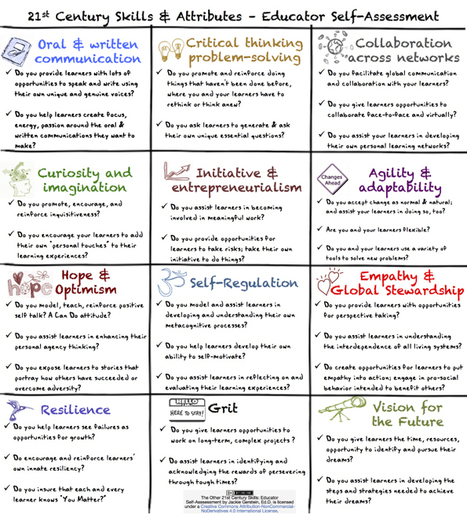


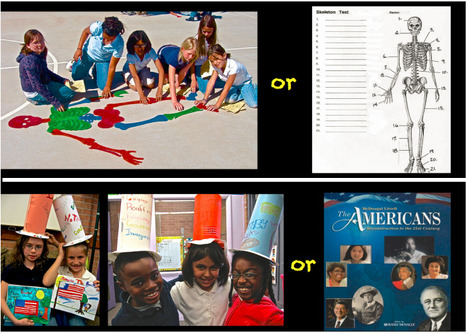

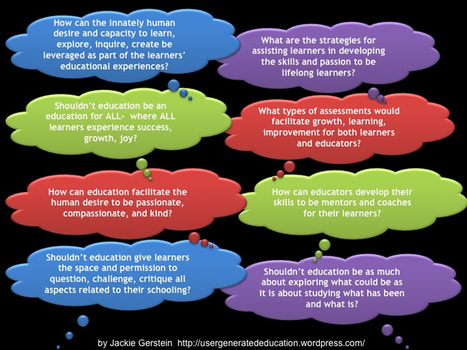

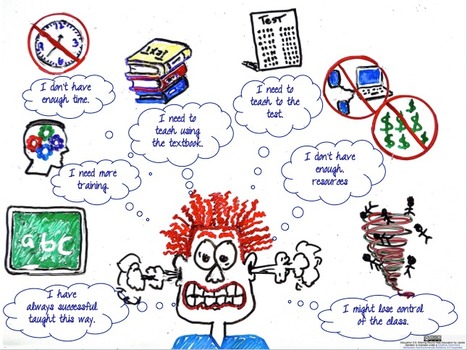








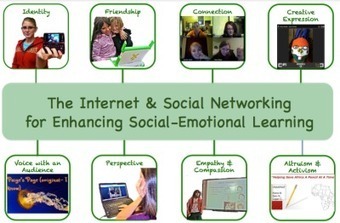


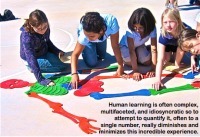




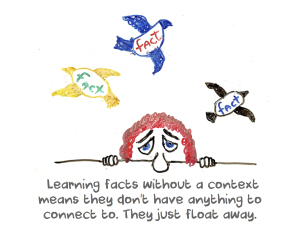




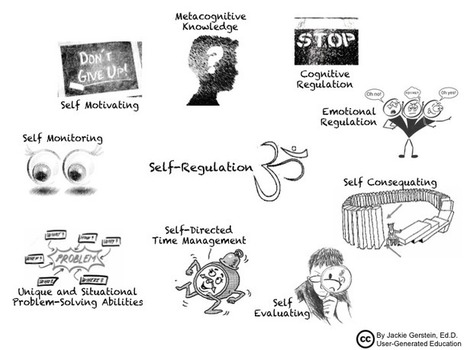
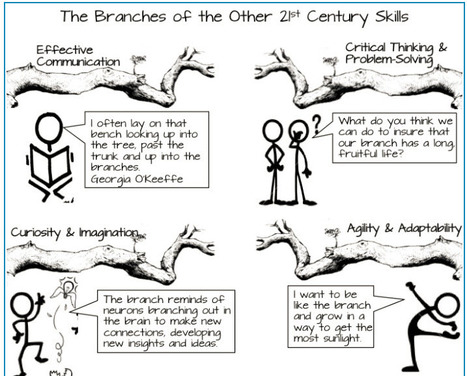


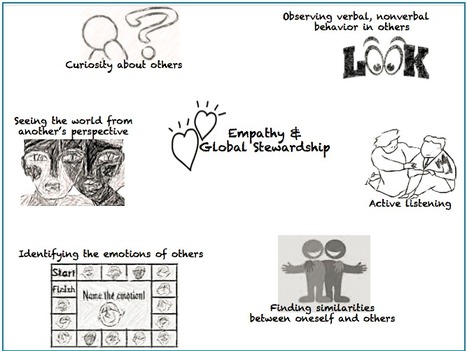

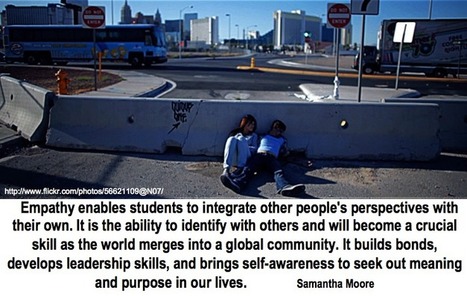

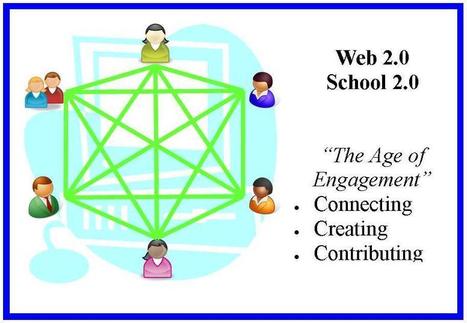


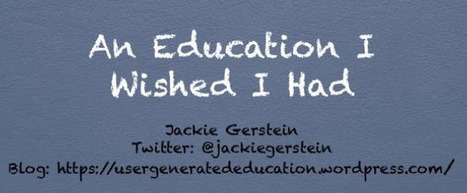



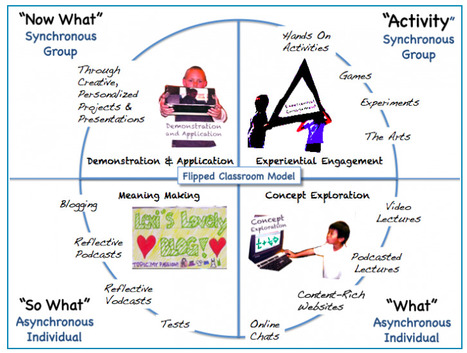





In our world today we are surrounded by visuals. Yet we walk into many classrooms and see many written texts that often have few visuals. This post begins with a quote from John Medina, the author of Brain Rules (and a developmental molecular biologist). He states "We are incredible at remembering pictures. Hear a piece of information, and three days later you’ll remember 10% of it. Add a picture and you’ll remember 65%. Professionals everywhere need to know about the incredible inefficiency of text-based information and the incredible effects of images (http://www.brainrules.net/vision)."
There is also a video that was created by students explaining their frustration with the lack of visual learning that takes place in the classroom.
Additional sections include:
* Use Visuals, Images, Data Visualizations, Infographics and Videos to Teach Concepts
* Use and Teach Learners How to Make Concept Maps and Graphic Organizers
* Use and Teach Learners How to Do Sketchnotes
* Allow and Encourage Learners to Show What They Know Through Visual Imagery
* Teach Visual Literacy
Jackie Gerstein provides a thought provoking post with links to additional resources. Take the time to read and consider how you might increase the use of visuals in your classroom. And if you have not read John Medina's book you might want to check out his website.
In our world today we are surrounded by visuals. Yet we walk into many classrooms and see many written texts that often have few visuals. This post begins with a quote from John Medina, the author of Brain Rules (and a developmental molecular biologist). He states "We are incredible at remembering pictures. Hear a piece of information, and three days later you’ll remember 10% of it. Add a picture and you’ll remember 65%. Professionals everywhere need to know about the incredible inefficiency of text-based information and the incredible effects of images (http://www.brainrules.net/vision)."
There is also a video that was created by students explaining their frustration with the lack of visual learning that takes place in the classroom.
Additional sections include:
* Use Visuals, Images, Data Visualizations, Infographics and Videos to Teach Concepts
* Use and Teach Learners How to Make Concept Maps and Graphic Organizers
* Use and Teach Learners How to Do Sketchnotes
* Allow and Encourage Learners to Show What They Know Through Visual Imagery
* Teach Visual Literacy
Jackie Gerstein provides a thought provoking post with links to additional resources. Take the time to read and consider how you might increase the use of visuals in your classroom. And if you have not read John Medina's book you might want to check out his website.